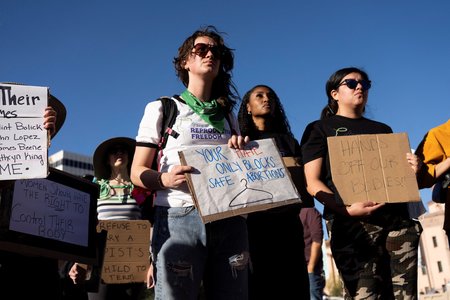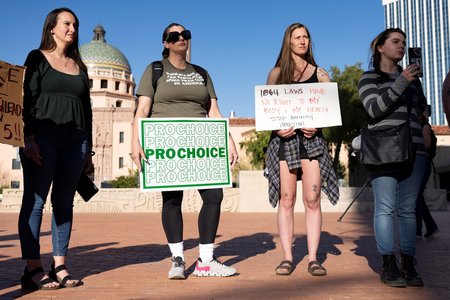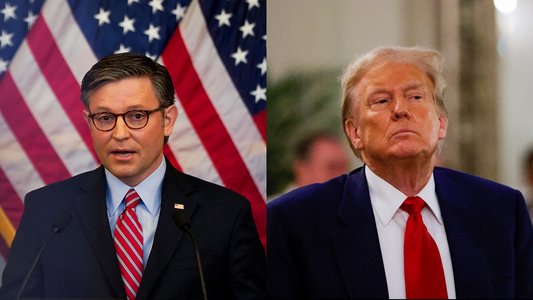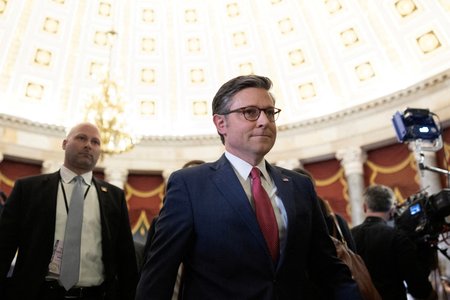Full Episode: National security and policing take center stage three days before the first Clinton/Trump debate
Sep. 23, 2016 AT 9:18 p.m. EDT
TRANSCRIPT
Notice: Transcripts are machine and human generated and lightly edited for accuracy. They may contain errors.
GWEN IFILL: Seven days of debate on terrorism, race and policing, and three days until the first general election debate. We’re chock-a-block tonight on Washington Week.
FORMER SECRETARY OF STATE HILLARY CLINTON: (From video.) This is a fast-moving situation and a sobering reminder that we need steady leadership in a dangerous world.
DONALD TRUMP: (From video.) It’s a terrible thing that’s going on in our world and in our country, and we are going to get tough and smart and vigilant.
MS. IFILL: Steadiness versus toughness, the 2016 choice in a nutshell. This week offered up plenty of examples of how Donald Trump and Hillary Clinton would handle the nation’s challenges, from terrorism in New York and New Jersey to police-involved shootings in Tulsa and Charlotte.
RAKEYIA SCOTT: (From video.) I know he better live.
MRS. CLINTON: (From video.) We have two more names to add to a list of African-Americans killed by police officers in these encounters. It’s unbearable –
PROTESTERS: (From video.) Release the video!
MRS. CLINTON: (From video.) – and it needs to become intolerable.
MR. TRUMP: (From video.) I would do stop-and-frisk. I think you have to. We did it in New York. It worked incredibly well.
MS. IFILL: This week’s responses, a preview of what we may see next week in the first general election debate. We take a closer look with Jennifer Jacobs, national politics reporter for Bloomberg News; Ed O’Keefe, political correspondent for The Washington Post ; Beth Reinhard, national politics correspondent for The Wall Street Journal ; and Pierre Thomas, senior justice correspondent for ABC News.
ANNOUNCER: Award-winning reporting and analysis. Covering history as it happens. Live from our nation’s capital, this is Washington Week with Gwen Ifill . Once again, live from Washington, moderator Gwen Ifill.
MS. IFILL: Good evening. Every week provides a new reminder of the choice that Americans will be asked to make on November 8th: Do we need a commander-in-chief who knows how to handle homegrown terror threats? Do we need one who knows how to calm inflamed communities when local police can’t or won’t? Or, most likely, do we need both?
Campaigning in North Carolina this week, Donald Trump linked the latest terror attacks to immigration.
MR. TRUMP: (From video.) Attack after attack, from 9/11 to San Bernardino to Orlando, we have seen how failure to screen who is entering the United States puts all of our citizens in great danger. I have been saying this for a long time. This didn’t just happen, like, yesterday. Immigration security is national security.
MS. IFILL: Hillary Clinton said what the country needs is an intelligence surge.
MRS. CLINTON: (From video.) Let’s not get diverted and distracted by the kind of campaign rhetoric we hear coming from the other side. This is a serious challenge. We are well-equipped to meet it. And we can do so in keeping with smart law enforcement, good intelligence, and in concert with our values.
MS. IFILL: Now, those two statements represent the bright line between Trump and Clinton, and that’s what I want to get down to with all of you all tonight, which is – but starting with you, Pierre, because we saw events this week in Charlotte and Tulsa which kind of grabbed our attention again and reminded us what leadership can and ought to be. Start by giving us a reminder of what happened in both those places.
PIERRE THOMAS: Well, the issue of race and policing crashed back into the national dialogue in the last seven to 10 days.
Tulsa: an African-American man, hands up, shot by police, caught on tape, suddenly on local and network television, just this week an officer charged in that case. This follows the dialogue the nation has been having really around –
MS. IFILL: That’s Terence Crutcher in Tulsa.
MR. THOMAS: Right.
MS. IFILL: Right.
MR. THOMAS: Exactly.
This follows the national dialogue we’ve been having, in part because of Colin Kaepernick, the football player who has been saying race and policing is a threat to black men everywhere.
Then Charlotte, another situation that’s more confusing; police saying one thing, the family and friends saying another.
MS. IFILL: And that’s Keith Scott.
MR. THOMAS: Keith Scott, a situation where police claim that he got out of the car with a gun, the family saying it was a book.
So right now you are seeing mistrust by many people in the African-American community playing out. The days are over in many communities where the African-American people will accept the word of the police before anything.
MS. IFILL: So in some ways it occurred to me, Ed, that this is – these are recurring and imminent threats that anybody who wants to lead this country is going to have to figure out how to cope with. So how did we see the people who would lead this country cope with it this week?
ED O’KEEFE: Well, the way they have been responding to these things for as long as they’ve been candidates.
You know, I think the Clinton response is sort of typical of her. It strikes a very serious and concerned tone. She increasingly has adopted the stance of so many who are so deeply concerned about this by saying, enough is enough; this has to stop.
Trump, you know, obviously holds back. He expresses some support and concern for the safety and the good will of law enforcement, and then makes the immigration argument, which he has made whether it’s San Bernardino or Charlotte this week, or other things. And then he – and he brings up the concerns about drugs as well, the idea that drugs may have had something to do with this. But as far as we know, certainly not in the Tulsa case, and it doesn’t appear to be in the Charlotte case. Correct me if I’m wrong.
And, you know, there are Americans in this country who like either of those answers. But what I continue to think about, and why I’m really intrigued about Monday night is, you know, there’s a certain percentage of this country that is very concerned about Tulsa and Charlotte and those kinds of incidents, but there’s another percentage of the country that’s more concerned about the Chelsea bombing, the Seaside Heights bombing, the Minnesota mall attack and San Bernardino. And you do have to be a president who can address both, and I think there’s concerns on either side that one or the other is incapable of dealing it – at least one, maybe both.
MS. IFILL: Well, let me go back to Pierre on the question of domestic terrorism. This also gives the candidates an opportunity to say, this is who I am, this is what kind of president I would be, but that is also not going away.
MR. THOMAS: Two very distinct arguments. On the one side, you see Hillary Clinton saying, look, the way that we are going to combat homegrown terrorism is to enlist the Muslim community to help us. On the other hand, you have Trump talking primarily about the need to vet more closely who is coming into the country.
That is a really interesting debate. I’ve heard law enforcement people talk about the fact that you do need to have proactive community members to tell you what’s happening because – let me give you a sense of the pressure the FBI is under.
There are currently 800 people that they believe have some kind of connection or interest in ISIS – 800. Imagine the number of cases –
MS. IFILL: In this country.
MR. THOMAS: In this country, in all 50 states. There are thousands of leads that come in about terrorism suspects every day – I mean, excuse me, every year. And what that means is that they’re under constant pressure to figure out, is this the person that’s going to eventually do it?
If you look at the case from this week, the Chelsea bomber case, they had interactions with his father. A neighbor allegedly overheard the father say: You’re a terrorist! You’re a terrorist! That information got passed along to the FBI. The FBI came out to interview him and he said: No, no, it was the heat of the moment; you know, we had a domestic dispute at the house. The FBI looked at his background, found no ties to terrorism and left the case. Well, two years later –
MS. IFILL: Here we are.
Beth, Donald Trump, when he speaks of these issues, at least up until this week, he has almost always cast these questions as a matter – especially in this so-called appeal to the African-American community – as matters of questions of poverty and crime. Now, it should be said we don’t actually hear Republicans talk that much over the years about poverty, though they do talk about crime. Is that the only way that we talk about race in this campaign?
BETH REINHARD: I mean, with Donald Trump, he has been making, as you said, this appeal to African-American voters, mostly in front of white audiences.
MS. IFILL: Which wouldn’t be an appeal to African-American voters.
MS. REINHARD: It’s confusing. I mean, I know –
MS. IFILL: I’m not confused, actually. (Laughter.)
MS. REINHARD: OK. OK. You know, is he really talking to black voters –
MS. IFILL: Yeah.
MS. REINHARD: – or is he talking to white people who want to think that he’s not as racist as they thought he might have been?
MS. IFILL: Yeah.
MS. REINHARD: So he talks about – he paints this very bleak picture of their lives, you know, as if all, you know, African-Americans live in the inner city and their schools are terrible and they’re all poor and they have no jobs, but I’m here to help you. And he says some similar things to Hispanics. And he made similar comments – you know, this week he did go to a black church. He was speaking to a black audience.
So many conflicting messages from Trump this week on race. You know, on one hand, he endorsed the stop-and-frisk policy, which, you know, minorities feel that they are targets and has been found unconstitutional. On the other hand, he has expressed sympathy for victims of police shootings but usually his solidarity is with the police. He made a comment this week about African-Americans being worse off than they have ever, ever, ever been.
MS. IFILL: Which is remarkable coming on the weekend of the opening of the African-American Museum –
MS. REINHARD: Yes.
MS. IFILL: – which perhaps may capture times when things were worse.
MR. THOMAS: Things were a little worse.
MS. REINHARD: A little worse.
MR. O'KEEFE: Like slavery, yeah.
MS. IFILL: Yeah.
MS. REINHARD: So this context is just – it’s really just like this stew of messages.
MS. IFILL: Yeah.
JENNIFER JACOBS: He immediately starts tying in with the Chelsea bomber, who is an American citizen, born in Afghanistan but raised here – immediately starts tying that case to immigration.
And he had that catchphrase, which was – we played, which was, “Immigration security is national security.” And what Donald Trump knows is that those short catchphrases stick in voters’ minds. And so even though he’s conflating some issues there –
MS. IFILL: But in some ways, isn’t that a very disciplined thing for a candidate to do, to bring whatever the national issue is back to your core issue, in this case immigration?
MS. JACOBS: And shift it right to his America First stances, which is exactly what he is doing is bringing it – everything right back to what, you know, he thinks will – voters have a lot of things coming at them right now, and he shifts it down into a small, compact phrase that will stick in people’s minds.
MS. IFILL: Well, like profiling, for instance, where he makes the case where profiling – and cites Israel – is actually pretty good, that it works.
Does it, Pierre? Do law enforcement people that you cover think so?
MR. THOMAS: You know, there are some in law enforcement that think that a way to have good policing is to look at the set of circumstances in front of you based on the facts in front of you, as opposed to looking at a person who looks a certain way and coming to a conclusion about them. Law enforcement increasingly believes that that can get you in trouble.
The issue that the country is grappling with is right now you’re seeing crime, and particularly violent crime, creep up in a number of major cities – not all cities but in a number of major cities, Chicago among them.
In those places, a disproportionate number of African-American males are involved in the crime. But every major law enforcement official I’ve talked to said, well, that may be the case in Chicago but does that mean that every black male you see in Chicago that you should pull over and frisk? The answer to that is no, because even in those communities where the crime is at its worst, you have a tiny percentage of people committing those crimes.
I recently talked to the police commissioner in Chicago and he said, Pierre, one-half of 1 percent of the population of the city is responsible for 80 percent of the crime.
MS. IFILL: That said, when he makes this case, Ed, about stop-and-frisk – whether the Constitution is just a politically correct document or not I suppose is part of the question he’s raising – Clinton responds by saying Trump is helping the terrorists, is helping with the recruitment of terrorists. There’s a little bit over-reaching on all sides here.
MR. O’KEEFE: Yeah, and that’s – I mean, we’ve heard this argument in previous presidential campaigns, I think dating back to the Bush-Kerry campaign, as I recall.
You know, the Clinton campaign and the Democrats generally are just trying to do everything they can to disqualify him, and just to continue to drive home that temperament and tone argument that he is incapable of dealing with these kinds of things, temperamentally unfit, too insulting, would cause, you know, wars by merely being – you know, feeling that he was slighted at the U.N. or something. And they feel that that’s an effective argument and they’ll continue to drive that home.
I think the risk, frankly, is that he hasn’t said anything terribly controversial that’s new, as opposed to controversial that we’ve heard before.
MS. IFILL: Right.
MR. O’KEEFE: Because a lot of all this has been talked about for more than a year. And so there’s – I think there’s some concern among Democrats that perhaps that argument could run its course in the next six weeks, get a little tired –
MS. IFILL: People have gotten used to it already.
MR. O’KEEFE: – and may not be compelling enough.
MS. IFILL: Well, let’s talk a little bit about the temperament issue, because there is another way to read the polls. You can read head-to-head, as you do, or you can read the polls as I did, as we do, leading into Monday night’s debate. You can be sure the candidates are reading them this way, just like we are.
The Wall Street Journal and NBC News asked likely voters what their top concerns were about each of the leading candidates. For Trump, more than half said they worried about his temperament and the language and comments he has directed toward women and immigrants. For Clinton, more than half worried about her dealings with Syria, Iraq and Libya and her use of a private email server when she was secretary of state.
In other words, voters are worried about his behavior now and her behavior then, just as the two opponents would have it.
What do you think about that, Jennifer?
MS. JACOBS: Well, I know that Trump is working on his temperament. That’s one of the major things that he has been working on. He has been glued to the teleprompter since mid-August.
MS. IFILL: Sure.
MS. JACOBS: And he barely went off of it this week.
MS. IFILL: Much to the disappointment of his crowds.
MS. JACOBS: Yeah, exactly. And so he has been working on, you know, saying the same things except saying it in a more refined way.
There was an interesting example this week in Ohio. He was at his rally in Toledo and there was a baby that was screaming and everyone in the audience could hear it, and he didn’t even flinch. You remember back in early August in Virginia when there was a crying baby and it really irritated him, and he went off and said: Get that baby out of here! And this time –
MS. IFILL: Maybe he thought he was joking but it didn’t come across like that.
MS. JACOBS: You could see the irritation.
MS. IFILL: Yeah.
MS. JACOBS: This time he didn’t even flinch. He was talking about trade. He just kept on plowing through it. And I talked to some of his aides about that and they said that’s actually a really good example of how he is just so much more disciplined now. He, in mid-August, was being told by his advisers: Listen, the GOP is going to cut you loose. They’re not going to risk losing the U.S. Senate because of you. They will start shifting their money elsewhere.
That is a real threat. So they were telling him: You could lose catastrophically and then your obituary in The New York Times , the first two lines will be about this presidential campaign and how you lost. And that really scared him into behaving differently, and they say that he has really stuck to that since then. This is him, and this is him wanting to win.
MS. IFILL: Right.
And as a reward, Beth, he gets Ted Cruz’s endorsement today – Ted Cruz, who probably could not have said more harsh things about him than has ever been said about a presidential candidate.
MS. REINHARD: Or vice-versa.
MS. IFILL: Yeah.
MS. REINHARD: I mean, you’ll remember Ted Cruz – Donald Trump, excuse me, insulted Ted Cruz’s wife and –
MS. IFILL: His father.
MS. REINHARD: – accused his father of murdering JFK.
MS. IFILL: Basically.
MS. REINHARD: So, yeah, boy, things have changed. And, you know, one of the, I think –
MS. IFILL: And Ted Cruz showed up at the convention and basically pulled the rug – or tried to pull the rug out from under Donald Trump by failing to endorse him while speaking on his stage.
MS. REINHARD: Right, and suggested that he wasn’t endorsing him because his conscience wouldn’t allow him to by saying, everyone vote your conscience.
MS. IFILL: That was then. This is now.
MS. REINHARD: Right. I mean, one of the things that’s been so interesting about this campaign is watching these, you know, other Republican leaders like Paul Ryan, like Marco Rubio try to figure out, how am I going to, like, you know, keep my principles intact while not alienating all the Republicans who like Donald Trump?
But I think what Ted Cruz’s endorsement says – I mean, it definitely speaks to the power of Trump and his popularity, because obviously Ted Cruz thinks that’s something he has to pay homage to.
MR. O’KEEFE: But I thought his seven-point Facebook explanation – (laughter) – that was posted on Friday afternoon speaks to what I think a lot of Republicans are –
MS. IFILL: It’s not six points, not eight points.
MR. O’KEEFE: Seven. (Laughter.)
MS. IFILL: Seven.
MR. O’KEEFE: You know, the threat was made: If you don’t shape up, we’re going to abandon you. Well, he shaped up.
And then look at his argument: The next president gets to appoint several seats to the Supreme Court. The next president has to figure out what to do about the future of Obamacare. The next president is going to have to weigh in on a lot of global concerns. And in every case, he feels Trump has met the test now of a true conservative. That’s what a lot of these Republicans, who I think are starting to come home or at least been assuaged of their concerns –
MS. IFILL: Wasn’t that true two months ago –
MR. O’KEEFE: Yeah.
MS. IFILL: – when we were at the conventions?
MS. JACOBS: Yeah, you’ve got some Cruz supporters who are very disappointed, including one of his former strategist’s posting on Facebook that it’s mourning in America, as in grieving time, that they’ve lost a leader.
MS. IFILL: Well, let’s look forward to the debate. Monday night we’re going to see what these folks have to do.
First of all, it’s the first debate, the first time we’ve seen them face to face, the first time Trump has been on stage one-on-one with someone. And I want to start with you by asking you whether – not that you have any insight into what Lester Holt is going to ask, but what are the chances that we’re going to be talking about these issues, that you – we even started tonight by talking about these concerns about domestic terrorism, domestic unrest, policing?
MR. THOMAS: I think it’s high because I don’t know how you could be the moderator and have two as powerful and searing issues that we’ve seen in the last two weeks – terrorism and race and policing – and not have the candidates address it.
Look, a lot of people are saying that the American public started to pay attention more after Labor Day to both these candidates. Monday night is the time when they’re going to hear them think out loud and people are going to begin to make their assessments.
So, you know, Lester Holt is in a position where – as you’ve been in before – where he gets to lay these issues out in a way – and have the candidates respond to them, where we really can begin to see how they think because, again, how much were people really listening to what their policy positions were leading up to Monday? Monday they get to hear it from them directly.
MS. IFILL: But how much are these debates – or will this debate, or can this debate, be about policy? How much of it is about who looks presidential?
Beth?
MS. REINHARD: I mean, there’s a lot of ground to cover. I mean, Donald Trump, as – he has been more accessible to the media than Hillary Clinton and he’s tried to use that as a wedge, but he really –
MS. IFILL: Well, the last week or so it’s been only Fox, but –
MS. REINHARD: It’s only Fox. And he does interviews on stories that are friendly to him. And the few situations where we’ve seen him really pressed on policy, he has stumbled. And so I think this is going to be a big test for him one-on-one. It’s not as – you referenced the primary, where there was a whole cast of characters on stage up there.
MS. IFILL: It’s really easy in a debate to change the topic when someone asks you about policy to talking about something else. Is that what you expect to see as well?
MS. JACOBS: Yeah, but if you think about it, you know, the last couple of weeks have been essentially debate prep on the trail for Donald Trump. Some candidates go behind closed doors and study.
With Trump’s handlers, they kind of threw him out there into some uncomfortable situations in front of some unfriendly audiences where he could get yelled at or booed, going into some largely black communities and going into black churches where he was in awkward situations, where he had one of his own surrogates drop the “N” word with him sitting and grinning right behind him.
MS. IFILL: That would be Don King. I think we can say his actual name.
MS. REINHARD: But he smiled. I don’t think it was awkward for him at all.
MS. JACOBS: I know, and that’s what I’m saying – (laughter) – is his handlers have put him through some, you know, unusual, challenging situations, things –
MS. IFILL: Sometimes a smile can be awkward, I think.
MS. JACOBS: Yeah, but I think the audience was laughing.
MS. IFILL: Yeah.
MS. JACOBS: I was in the room, and he was responding to the rest of the audience in that room and they were chuckling. And because Don King was, I think, deliberately trying to be witty – I mean, he was making a very serious point about –
MS. IFILL: Don King was telling, he thought, jokes.
MS. JACOBS: That’s correct.
MS. IFILL: And his serious point was actually that no matter how high you rise, if you’re black you’re still only going to get so far. It’s just that he decided to tell it in a, how shall we say, complicated way.
MR. THOMAS: Gwen, you know, the pressure really is on our profession –
MR. O’KEEFE: Yeah.
MR. THOMAS: – journalism. That is going to be an opportunity to ask pointed questions. And there’s nowhere to hide. You’ve got to answer the question.
MS. IFILL: No you don’t, actually, but OK. (Laughter.)
MR. THOMAS: Really?
MS. IFILL: No. I am here to say you don’t have to answer the –
MR. THOMAS: Wow.
MS. IFILL: Sarah Palin said to me: I don’t feel I have to answer that. I’m not here to answer the moderator’s question. Then she went in her own direction.
MR. O’KEEFE: And to this point, the Clinton campaign on Friday was pushing on the idea that, you know, you in the media –
MS. IFILL: Yeah.
MR. O’KEEFE: – on a call with reporters, should be prepared to call him out for being a liar, should it happen during the debate, before the debate, after the debate. They used the “L” word, gosh, at least 20 times over the course of this call. And they said, while we have not communicated this directly to Mr. Holt, we do expect him to call him out, if need be, if Clinton for some reason can’t or isn’t able to.
MS. IFILL: Reporters really like – reporters really like being told by partisans what to do.
MR. O’KEEFE: Exactly.
MS. REINHARD: And you know what?
MR. THOMAS: So we are on trial too.
MR. O’KEEFE: Yes.
MS. REINHARD: Reporters are going to –
MS. IFILL: Well, that’s going to happen.
MS. REINHARD: Reporters have been screaming at the top of their lungs. They’ve been truth-squading Donald Trump for months. And guess what? The voters don’t seem to care.
MR. O’KEEFE: Right.
MS. JACOBS: I can tell you that Donald Trump and his aides go into this debate very, very confident. And actually, not everyone in his inner circle thinks that this is a decisive event. They can say – the pundits are not always right when they say that this is going to be this crucial, amazing thing that we’re all counting down and the whole campaign could hinge on this.
They’re very confident that he will do well and that their strategy, which is, you know, concentrating on certain states and winning over those swing states, and doing the big rallies and getting the free media, they’re still going to continue with that. You know, they’re arguing that this debate isn’t the end-all be-all.
MS. IFILL: Well, that’s what you would argue if you had a lot riding on it. (Laughter.) We’ll see. It will be fun to watch. Thank you, everybody.
PBS NewsHour is going to provide full coverage of Monday’s debate. I’ll have the popcorn just off to the side. Judy Woodruff and I are joined by David Brooks, Mark Shields and Amy Walter.
Online you can find my take on this week on “How to Moderate a Debate.” Yes. It might not be what you think. That’s at PBS.org/WashingtonWeek. And on Tuesday, be sure to catch Frontline’s acclaimed election year series, “The Choice.”
And we’ll see you next week on Washington Week . Good night.
MOST POPULAR


Full Episode: Washington Week with The Atlantic full episode, 4/12/24


Clip: Democrats seize opportunity to make gains after Arizona abortion decision


Clip: Johnson visits Mar-a-Lago to shore up support from Trump amid uncertain speakership

Preview: Coming Up on Washington Week with The Atlantic


Full Episode: Washington Week with The Atlantic full episode, 4/5/24

© 1996 - 2024 WETA. All Rights Reserved.
PBS is a 501(c)(3) not-for-profit organization


